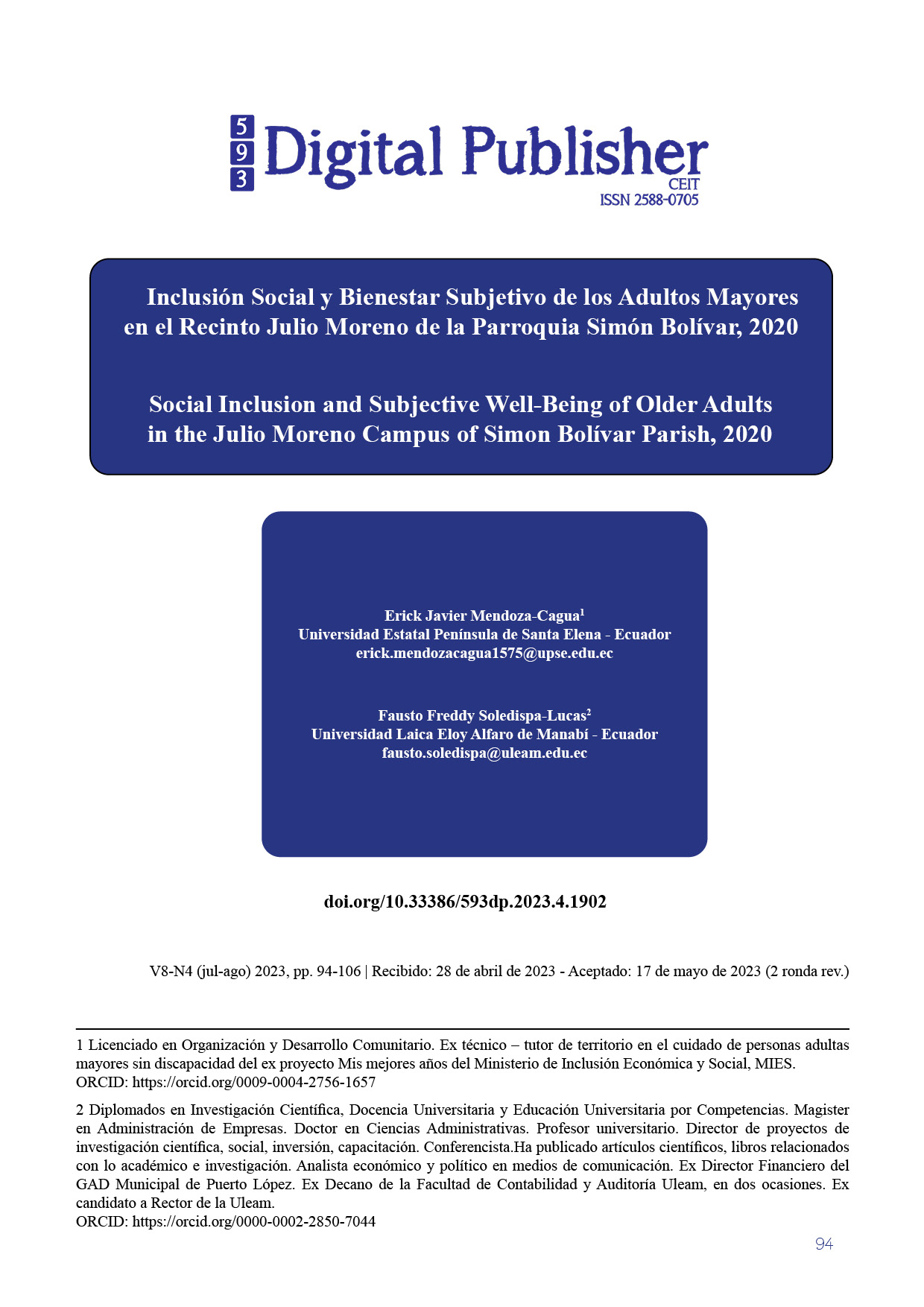Social Inclusion and Subjective Well-Being of Older Adults in the Julio Moreno Campus of Simon Bolívar Parish, 2020
Main Article Content
Abstract
Older adults are part of a vulnerable group that in many cases do not feel well at home and in most cases are considered a burden since they are not working and their income is limited. The objective of this research is to analyze the relationship between social inclusion and subjective well-being through a correlational study, for the design of a project to improve the quality of life of older adults in the Julio Moreno campus of the Simon Bolívar parish. The design of the applied study was cross-sectional, with a mixed and cross-sectional approach, where it is concluded that depression, anxiety, and income are very limited and most do not receive family support, which generates discomfort. Among the results obtained is that most do not have family support, with limited income and that for this reason they present depression and sadness because they do not feel useful within their family and social environment.
Downloads
Article Details

This work is licensed under a Creative Commons Attribution-NonCommercial-ShareAlike 4.0 International License.
1. Derechos de autor
Las obras que se publican en 593 Digital Publisher CEIT están sujetas a los siguientes términos:
1.1. 593 Digital Publisher CEIT, conserva los derechos patrimoniales (copyright) de las obras publicadas, favorece y permite la reutilización de las mismas bajo la licencia Licencia Creative Commons 4.0 de Reconocimiento-NoComercial-CompartirIgual 4.0, por lo cual se pueden copiar, usar, difundir, transmitir y exponer públicamente, siempre que:
1.1.a. Se cite la autoría y fuente original de su publicación (revista, editorial, URL).
1.1.b. No se usen para fines comerciales u onerosos.
1.1.c. Se mencione la existencia y especificaciones de esta licencia de uso.
References
Alvarado, A., & Salazar, A. (2014). Análisis del concepto de envejecimiento. Gerokomos, 5(2), 57-62. https://doi.org/10.4321/S1134-928X2014000200002
Aranda, R. (2018). Actividad física y calidad de vida en el adulto mayor. Una revisión narrativa. Rev Haban Cienc Méd, 17(5), 813-825
https://sites.google.com/site/diccionarioserviciosocial/f-g
http://scielo.sld.cu/pdf/rhcm/v17n5/1729-519X-rhcm-17-05-813.pdf
Arévalo, D., Game, C., Padilla, C., & Wong, N. (2020). Predictores de satisfacción con la calidad de vida en adultos mayores de Ecuador. Revista ESPACIOS, 41(12), 10. https://scielo.conicyt.cl/pdf/infotec/v30n5/0718-0764-infotec-30-05-00271.pdf
https://www.redalyc.org/pdf/5177/517751549002.pdf
Ávila, A., & Fullana, A. (2016). El miedo en el cerebro humano. Mente & Cerebro, 78(1), 50–51. https://www.investigacionyciencia.es/files/23528.pdf
Ballena, C., Cabrejos, L., Davila, Y., Mejía, G., RamoS, V., & Barboz, J. (2021).
Becerra, D. (2020). Ansiedad ante la muerte en adultos peruanos, durante la pandemia de la COVID-19. Revista Cubana de Enfermeria, 1–5.
Bustamante, M., Lapo, M., Núñez, M., & Zambrano, L. (2020). Factores de satisfacción con la vida en adultos mayores en zonas urbanas y rurales de Guayas, Ecuador. Revista Empresarial, 14(1), 23–29. https://editorial.ucsg.edu.ec/ojsempresarial/index.php/empresarial-ucsg/article/view/174/163
CEPAL. (2018). Envejecimiento, personas mayores y Agenda 2030 para el Desarrollo 83 Sostenible: perspectiva regional y de derechos humanos, Libros de la CEPAL, N° 154 (S. Huenchuan (ed.)). https://www.cepal.org/es/publicaciones/44369- envejecimiento-personas-mayores-agenda-2030-desarrollo-sostenibleperspectiva
https://www.redalyc.org/pdf/3498/349851791013.pdf
Dialnet-MiedoYAnsiedadAnteLaMuerteEnElContextoDeLaPandemia-7544334.pdf
CEPAL. (2020). Covid-19 y sus impactos en los derechos y la protección social de las personas mayores en la subregión (Naciones Unidas (ed.)).
Chavez, S., & Yhuri, N. (2016). Salud y calidad de vida en adultos mayores de un área rural y urbana del Perú. Revista Peruana de Medicina Experimental y Salud Pública, 33(4), 680–688. https://www.redalyc.org/pdf/363/36349330010.pdf
Constitución de la República del Ecuador. (2008). Sección primera Adultas y Adultos mayores, articulo 36. http://www.regulacionagua.gob.ec/wpcontent/uploads/downloads/2020/12/reglamento_lopam0382842001601663401. pdf
Cevallos Sarzosa, M. A. (2013). Exclusión del adulto mayor en programas sociales, de la Parroquia de Conocoto, período 2011-2012 y sus efectos en la calidad de vida. Quito.
Chiriboga, M. (2020). Agricultura, espacios rurales y medio ambiente en el marco de la globalización. Bogotá.
García, M. (2002). El bienestar subjetivo, Departamento de Psicología social Málaga, https://www.uma.es/psicologia/docs/eudemon/analisis/el_bienestar_subjetivo.pdf
Kopernicu, L. (2021). El bienestar subjetivo en la pandemia del covid-19, https://www.aacademica.org/000-012/307.pdf
Jocik, G., & Diaz, J. (2017). Bienestar subjetivo del Adulto Mayor. OLIMPIA. Revista de la Facultad de Cultura Física de la Universidad de Granma, Vol.14 No.46.
MIES. (2022). Analisis multidimensional de la población adulta mayor. Obtenido de https://info.inclusion.gob.ec/phocadownloadpap/estudios/atencion_intergeneracional/2013/analisis_multidimensional_del_bienestar_en_pam_y_efectos_de_las_politicas_publicas.pdf
Ramírez, M. J. (2008). Aproximación teórica de la exclusión social: complejidad e imprecisión del termino. Consecuencias para el ámbito educativo. Scielo, 174. https://www.scielo.cl/scielo.php?script=sci_arttext&pid=S0718-07052008000100010
Rizo López, A. E. (2006). ¿A qué llamamos exclusión social? Polis, Revista de la Universidad Bolivariana. https://www.redalyc.org/pdf/305/30517306018.pdf



